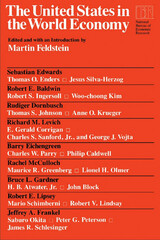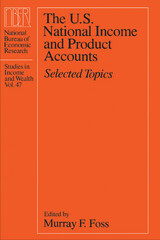135 books about Macroeconomics and 4
start with U
135 books about Macroeconomics and 4
135 books about Macroeconomics
4 start with U start with U
4 start with U start with U

Understanding Economic Recovery in the 1930s
Endogenous Propagation in the Great Depression
Frank G. Steindl
University of Michigan Press, 2003
Although much has been published about the economic downturn that began in mid-1929, very little has been written about the recovery from this cataclysmic period. Long, tortuous, and uneven as it was, there was indeed a recovery. In this important book, Steindl explores the much-neglected topic of the recovery, concentrating in particular on the macroeconomic developments responsible for the move back to a pre-Depression level economy.
Providing strong evidence for the role of the quantity of money in the revitalization, the author ultimately concludes that the seemingly robust monetary explanation of the recovery is deficient, as is any that relies principally on aggregate demand impulses. An accurate understanding of this phenomenon must account for the inherent tendency of the economy to revert to its long-run high employment trend.
Frank G. Steindl is Regents Professor of Economics and Ardmore Professor of Business Administration, Oklahoma State University.
Providing strong evidence for the role of the quantity of money in the revitalization, the author ultimately concludes that the seemingly robust monetary explanation of the recovery is deficient, as is any that relies principally on aggregate demand impulses. An accurate understanding of this phenomenon must account for the inherent tendency of the economy to revert to its long-run high employment trend.
Frank G. Steindl is Regents Professor of Economics and Ardmore Professor of Business Administration, Oklahoma State University.
[more]

The United States in the World Economy
Edited by Martin Feldstein
University of Chicago Press, 1988
The United States in the World Economy offers the results of a conference organized by the National Bureau of Economics in 1987. The volume includes background papers prepared by nine academic economists, personal statements by individuals prominent in government and business, and summaries of the discussion that followed the presentations. Among the topics considered are foreign competition in Latin America and the Asian Pacific Rim, Third World debts, innovations in international financial markets, changing patterns of international investment, international capital flows, and international competition in goods, services, and agriculture. Prepared for a sophisticated but non-technical audience, these papers present complicated economic issues clearly, indicating the many ways in which the American economy influences and is influenced by economic events and conditions around the world.
[more]

Unveiling Inequality
A World-Historical Perspective
Roberto Patricio Korzeniewicz
Russell Sage Foundation, 2009
Despite the vast expansion of global markets during the last half of the twentieth century, social science still most often examines and measures inequality and social mobility within individual nations rather than across national boundaries. Every country has both rich and poor populations making demands—via institutions, political processes, or even conflict—on how their resources will be distributed. But shifts in inequality in one country can precipitate accompanying shifts in another. Unveiling Inequality authors Roberto Patricio Korzeniewicz and Timothy Patrick Moran make the case that within-country analyses alone have not adequately illuminated our understanding of global stratification. The authors present a comprehensive new framework that moves beyond national boundaries to analyze economic inequality and social mobility on a global scale and from a historical perspective. Assembling data on patterns of inequality in more than ninety-six countries, Unveiling Inequality reframes the relationship between globalization and inequality within and between nations. Korzeniewicz and Moran first examine two different historical patterns—"High Inequality Equilibrium" and "Low Inequality Equilibrium"—and question whether increasing equality, democracy, and economic growth are inextricably linked as nations modernize. Inequality is best understood as a complex set of relational interactions that unfold globally over time. So the same institutional mechanisms that have historically reduced inequality within some nations have also often accentuated the selective exclusion of populations from poorer countries and enhanced high inequality equilibrium between nations. National identity and citizenship are the fundamental contemporary bases of stratification and inequality in the world, the authors conclude. Drawing on these insights, the book recasts patterns of mobility within global stratification. The authors detail the three principal paths available for social mobility from a global perspective: within-country mobility, mobility through national economic growth, and mobility through migration. Korzeniewicz and Moran provide strong evidence that the nation where we are born is the single greatest deter-mining factor of how we will live. Too much sociological literature on inequality focuses on the plight of "have-nots" in wealthy nations who have more opportunity for social mobility than even the average individual in nations perennially at the bottom of the wealth distribution scale. Unveiling Inequality represents a major paradigm shift in thinking about social inequality and a clarion call to reorient discussions of economic justice in world-historical global terms.
[more]

The U.S. National Income and Product Accounts
Selected Topics
Murray F. Foss
University of Chicago Press, 1983
The main topics treated in this conference volume are problems of deflation and quality change, the adequacy of the data used to construct the U.S. national accounts, and the broad theoretical evolution of the U.S. national income and product accounts. As these topics suggest, this volume represents a new stage in the study of national income and product accounts in that emphasis is placed on the information content of the system rather than on the structure of the accounts. This new emphasis is highlighted by the inclusion of a discussion among prominent users of the national accounts—Lawrence Klein, Otto Eckstein, Alan Greenspan, and Arthur Okun—that indicates the difficulties that confront those who utilize this information.
[more]
READERS
Browse our collection.
PUBLISHERS
See BiblioVault's publisher services.
STUDENT SERVICES
Files for college accessibility offices.
UChicago Accessibility Resources
home | accessibility | search | about | contact us
BiblioVault ® 2001 - 2024
The University of Chicago Press









